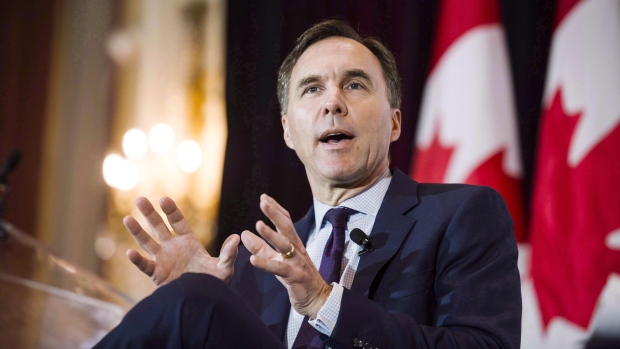Nov 21, 2018
‘Really inadequate response’: Experts react to Morneau’s fiscal update

Finance Minister Bill Morneau announced a series of measures in a fiscal update Wednesday aimed at addressing Canadian business leaders’ concerns over Canada’s eroding competitiveness on the global stage.
The federal government unveiled $14 billion worth of corporate tax breaks over the next six years, along with measures to allow businesses to write-off capital investments faster than before.
Morneau’s fiscal update, however, is drawing both praise and criticism. Some experts say the government is now even further away from balancing the budget, while others are warning that the business incentives are not enough to help sectors like the struggling oil patch.
Here’s how experts on BNN Bloomberg are reacting to the federal government’s plan:
“What worries me as a former finance minister is you can’t be blase about how you’re ever going to get back to balance, when you’re running deficits that are so enormous. If you think back to [Jean Chretien] and [Paul Martin], and how hard it was for them to work out of the difficult situation they were in at that time. They had to cut everything – cut transfers to provinces, cut programming, cut, cut, cut … I’m telling you, we’re setting up a situation here. If we’re talking $18 billion to $19 billion deficits, that’s going to be very difficult to crawl out of.”
Carole Taylor, former B.C. finance minister
“I don’t really think incentives to invest through accelerated depreciation is going to change the investment picture in the oil patch, particularly given what oil prices have done recently. But on the margin, when we look outside the resource sector, we have a lot of businesses operating at full capacity … So, businesses do have an increasing need to invest, and today’s announcement around appreciated depreciation on the margin will help or encourage some businesses to do some additional investment. But, it’s not going to lead economic forecasters like myself to really change our economic outlook.”
Craig Alexander, partner and chief economist, Deloitte
“I also feel the proposal of accelerated depreciation, while useful for a number of companies at this point, is really not the best response for a much more competitive tax system. In fact, I think this is a really inadequate response… It will have some impact, but not really addressing all the issues that we need to deal with in terms of competitiveness.”
Jack Mintz, president’s fellow at the School of Public Policy, University of Calgary
“There should have been specific reference to the situation we’re facing in our energy sector and a commitment to get our resources to market. I’m disappointed as well that there isn’t a clear strategy to bring the books back into balance. But, there are other elements that are positive. The accelerated write-offs go beyond what were anticipated, and the other area where there’s real progress being made is in terms of regulatory reform.”
Perrin Beatty, CEO, Canadian Chamber of Commerce
“I was frankly pleasantly surprised. What it says to me is the government does understand in what it means to be in a competitive environment globally, and that not taking any actions would have been crazy quite frankly. But, the actions that they did take, of course, it’s going to dominate headlines, and people will see this as some big reward for business. The reality is businesses are going to be able to invest in our economy. They’re going to be able to invest in innovation, they’re going to be able to invest in infrastructure. They’re going to be able to, most importantly, create jobs. That’s the fiduciary duty of the government, next to our national security.”
Goldie Hyder, president and CEO, Business Council of Canada
“We’re importing oil from Venezuela and Saudi Arabia when we’ve got discounted oil in Calgary. And quite simply, pipelines are a safe and effective way to move new product, and I’d sooner see that product coming from Western Canada than coming from outside foreign countries.”
Brad Smith, chair, mainland Nova Scotia Building Trades


